On August 21, the two-week 2025 “Future Power and Energy Systems” (FPES) Summer School, organized by the Department of Electrical Engineering and Applied Electronics (EEA) at Tsinghua University, concluded successfully in Beijing. After completing in-depth studies on frontier energy topics, 29 participants from 21 universities across 21 countries embarked on a field study trip to Ulanqab, Inner Mongolia, extending their theoretical knowledge to the forefront of China’s power and energy transition and digital economy development.
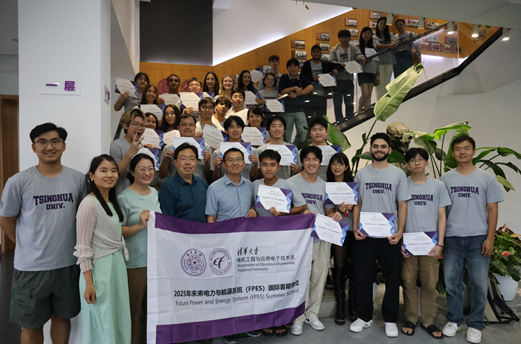
Closing Ceremony Group Photo
The closing ceremony was hosted by EEA faculty member Zhang Pengcheng. EEA Deputy Dean Sun Kai delivered the opening remarks, emphasizing that building future power systems is a global challenge critical to sustainable development and expressing hope that participants would apply what they learned to their future academic and professional pursuits. He highlighted that Tsinghua EEA would remain a long-term platform for academic exchange, welcoming participants back for seminars, research sharing, and advanced study opportunities.
Professor Hu Zechun, Chair of the Summer School Organizing Committee, summarized the overall activities of the program. He highly praised the participants’ academic reports on their respective national power systems, noting that they collectively reflected common challenges in global energy development. He expressed the hope that the summer school provided a window for participants to understand China and welcomed future visits to experience China’s diverse culture and development opportunities.
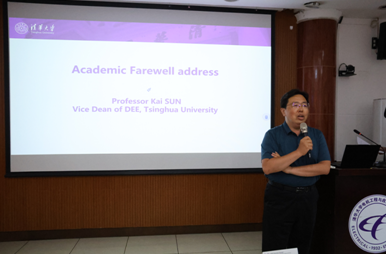
Sun Kai Delivering Remarks
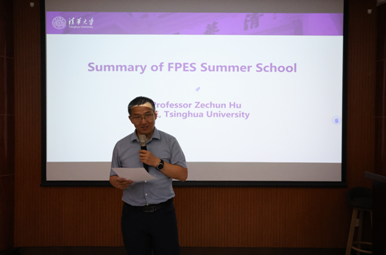
Hu Zechun Summarizing the Summer School
Student representatives Ilya Niafiodau from Belarus, Marie Meyer Have from Denmark, and Kyi Phyu Win Thant from Myanmar shared their experiences and takeaways from the program. Ilya highlighted the cross-cultural value of the trip, gaining deep insights into peers’ diverse perspectives on global issues such as sustainable development and forming valuable international friendships. Marie focused on technical aspects, noting that exposure to frontier technologies such as wireless charging and data center demand-side management demonstrated China’s substantial potential and achievements in pursuing carbon neutrality. Kyi, while praising the academic value of the courses, extended a warm invitation to fellow participants to visit the University of Hong Kong for future academic exchanges and collaboration. Together, their remarks reflected the participants’ recognition of the academic depth and cross-cultural exchange outcomes of the summer school.

Student Representatives Speaking
The summer school offered a rich schedule. Academically, participants attended frontier lectures delivered by nine EEA faculty members, covering low-carbon power systems, digital grids, advanced transmission technologies, and electric aircraft. Practically, participants visited Tsinghua Nankou State Key Laboratory and Xiaomi automotive factory, and conducted field studies in Ulanqab, Inner Mongolia, including the Three Gorges Wind-PV-Storage Base and Century Internet Data Center, gaining insights into the latest developments in China’s energy and power sector. Participants also experienced Chinese traditional culture through calligraphy, guzheng, martial arts, and fan-making activities, as well as visits to historic landmarks such as the Temple of Heaven and the Great Wall, gaining a multi-dimensional understanding of China’s rich history and modern vitality.
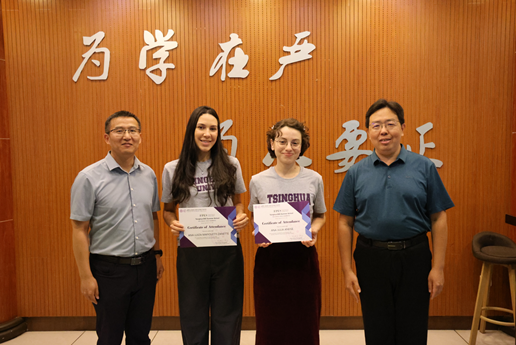
Certificate Awarding Ceremony
The ceremony concluded with Professors Sun Kai and Hu Zechun jointly awarding certificates to all participants, marking the successful completion of the Beijing phase of the summer school.
From Classroom to Grassland: FPES Summer School Field Study in Ulanqab
On the morning of August 22, the entire group traveled by high-speed train to Ulanqab for field studies on advanced technology enterprises and Inner Mongolian folk culture. The first stop was the Three Gorges Ulanqab Source-Grid-Load-Storage (SGLS) Technology R&D and Test Base, a facility integrating R&D, demonstration, and application, with deep collaboration between industry, academia, and research.
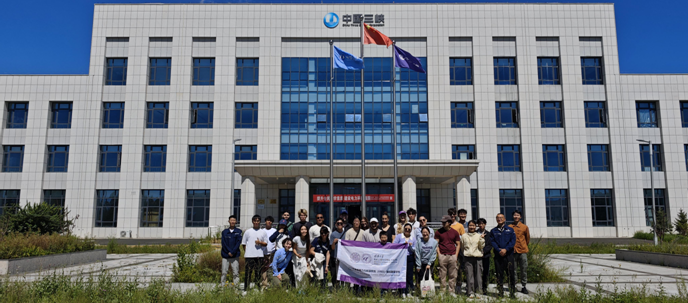
Group Photo at the Three Gorges Base
Under guidance from the base director, participants visited indoor facilities including a solid-state lithium-ion battery energy storage station (1MW/2MWh + 0.5MW/1MWh), a second-generation aqueous sodium-ion battery demonstration project (2.5MW/6MWh), and a next-generation 25kW/100kWh all-vanadium flow battery project. Students from various countries engaged in lively discussions with experts on the economics, applications, and environmental benefits of advanced electrochemical storage technologies.
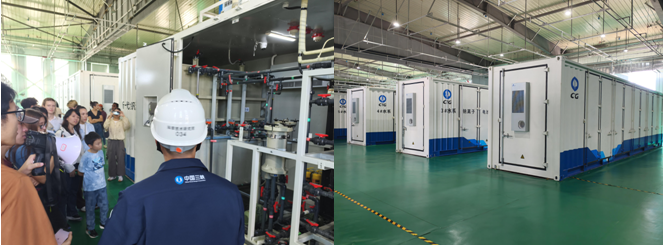
Visiting Advanced Electrochemical Storage Systems
Next, participants explored outdoor facilities, including dish-type Stirling solar generators, multi-source heat storage compressed air energy storage stations, and long-duration hydrogen fuel cell combined heat and power systems. Experts explained the working principles and key technical challenges of these systems in accessible terms, analyzing the importance of physical and electrochemical storage for the safe and economical operation of new power systems. Participants inquired about the full technical chain of green hydrogen production, storage, transportation, refueling, and utilization.
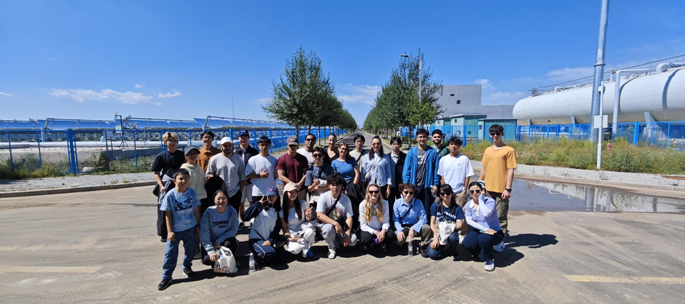
Visiting Photovoltaic and Compressed Air Storage Equipment
On the afternoon of August 22, the group visited the Century Internet (Ulanqab) Supercomputing Data Services Co., Ltd. Students learned that in the era of global digitalization, the big data industry has become a critical driver of economic growth and social progress. Computing power, as the core productivity of the digital economy, generates enormous electricity demand, requiring high-quality energy supply technologies. Benefiting from its unique location, abundant clean energy resources, and forward-looking strategic planning, Ulanqab transformed in just over a decade from a traditional agricultural and industrial city into the nationally renowned “Grassland Cloud Valley,” becoming a key node in the integrated national computing network in the Beijing-Tianjin-Hebei region.
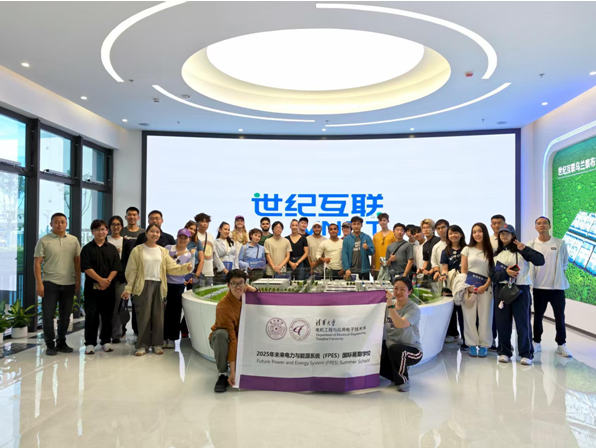
Group Photo at VNET Data Center
Participants toured the 220kV substation, medium/low-voltage distribution rooms, battery rooms, diesel generator area, and main server and air-conditioning rooms. They learned that as a major power consumer, VNET directly draws electricity from high-voltage transmission lines and maintains its own on-site distribution network. To ensure stable operation of critical data equipment, an uninterrupted power supply system mitigates external grid voltage and frequency fluctuations, while electrochemical storage and diesel generators provide short- and long-duration backup, respectively. Considering server temperature and humidity requirements, the company also employs fluorine-pump-based air conditioning systems to significantly reduce energy consumption.
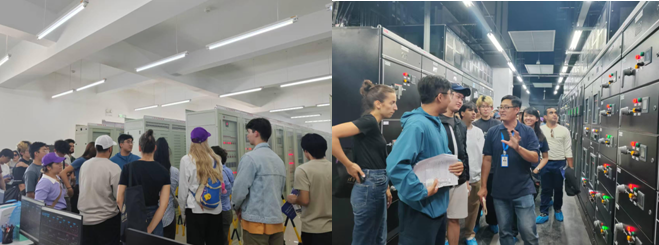
Visiting Data Center Power Supply Systems
Beyond technical studies, the itinerary included rich cultural experiences. Participants explored the vast grasslands, appreciating Inner Mongolia’s unique natural landscapes and local customs, gaining a more holistic and perceptive understanding of Chinese ethnic and regional cultures. On the afternoon of August 23, the group returned to Beijing, concluding the fulfilling and colorful Ulanqab trip.
The 2025 FPES Summer School, through its innovative “Tsinghua classroom + Beijing visits + Inner Mongolia field study” model, not only deepened exchanges among outstanding young scholars in the global energy sector but also provided a unique window to observe China’s energy development. It aims to contribute to building a global education cooperation network and cultivating future energy leaders with international vision and practical capabilities.

















 News & Events
News & Events